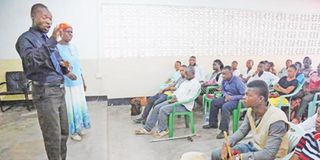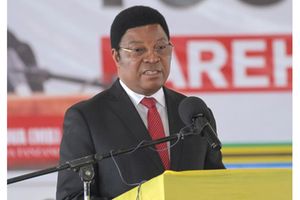A church catering for spiritual needs of the deaf

Believers at the Buguruni- Malapa church follow the sermon attentively as Calvin interprets the word of God during a recent Sunday service.
PHOTOS | EDWIN MUJWAHUZI.
What you need to know:
Although the majority could not hear Beatrice Mapunda’s beautiful voice, they followed by gazing attentively at Calvin Oscar, a sign language interpreter standing next to her. To enable the interpreter keep pace with her, Beatrice had to slow down from time to time and at times repeat verses.
On a recent Sunday morning at a church in Buguruni, a tall, slim, light skinned girl with hair braided in cornrows (twende kilioni) sung a hymn in front of the congregation.
Although the majority could not hear Beatrice Mapunda’s beautiful voice, they followed by gazing attentively at Calvin Oscar, a sign language interpreter standing next to her. To enable the interpreter keep pace with her, Beatrice had to slow down from time to time and at times repeat verses.
Beatrice, in her 20s is among a few hearing members of Immanuel Church for the Deaf TZ (ICD-TZ) at Buguruni Malapa in Dar es Salaam.
Vividly excited, the congregation held their hands in the air and twisted them a couple of times, the sign for deaf applause, when Beatrice finished singing.
After Beatrice, a group of youth, four girls and a young man, all who had hearing impairement took to the podium and started singing in sign language. The believers rose and sung along with them.
This time, Calvin, the interpreter sat with a few people in the church who could hear to interpret the song for them. These sit separately to enable smooth translation services.
While the singing continued, my mind wondered through the house of worship where the podium was well decorated with well-arranged red, white, yellow and blue satin fabrics. The pulpit was covered with a white cloth with a red cross printed on the front side. On top lay a Bible and a register book used to keep collections records. On the right side of the podium was an office chair and a fluorescent tube light that leaned on a speaker stand.
A big black standing fan, the only one in the church stood on the left hand side, blowing cold air across the hall. Next to it was a drum. On the wall was a 32 inch Samsung flat screen TV set and next to it, on the window hung a wall clock. Believers sit on plastic chairs and on that particular day, over 100 believers attended the service.
When the choir was done, the pastor, a tall, slim and charming gentleman in a neat long sleeve pink shirt and brown trousers got on to the stage and started praying in sign language. After the brief prayer, smiling, Pastor Daniel Njihia, asked the congregation; “Who woke us up today so we could come here?” to which the believers answered “Jesus.” The pastor continued giving the sermon while I followed through the interpreter. From time to time, he would refer to verses in the Bible and the believers would flip through the pages in their Bibles to read.
God is with us always
Immanuel church for the deaf was established in 1997 to cater for spiritual needs of people with hearing impairment. With a total of 700 believers countrywide, the church headquarters is located in Buguruni Malapa, a few metres from Uhuru Road.
The name, Immanuel, which is Hebrew for God is with us, was purposely chosen given that people with hearing impairment are marginalised in mainstream churches. Joseph Hiza, the church General Secretary tells me they believe God has not abandoned them.
Over a hundred Christians with hearing impairment from various denominations come here to worship every Sunday.
At the church entrance on a blue gate, the following is scribbled; Immanuel Kanisa la Viziwi Tz, also written in English as Immanuel Church for the Deaf Tz, After which is written underneath, New Life for the Deaf in Tanzania (NELIDETA).
The service on Sunday starts at 9 am through to 12:30pm. Thursdays are dedicated for fellowships from 3 to 5pm.
Believers say they have found a new life at Emmanuel church since they used to feel isolated in conventional churches where there are no translation services.
Sensor Joseph, 37, used to worship at Lutheran and Anglican churches but he ended up frustrated since there were no sign language interpreters in these churches.
“I was not happy there. I used to just sit in church watching the fans rotate on the roof. I realised I was wasting my time and found staying at home a better option,” recalls Joseph.
Joseph was introduced to Emmanuel church by friends when he was studying at the Buguruni school for the deaf. The father of three has been worshipping at the church ever since.
Like Joseph, Emmy Oscar, 41, also found a solace at Emmanuel church after having undergone the same problem in the Roman Catholic church.
“I joined ICD-T in 2001 where my husband who is also deaf was worshipping. I used to feel uncomfortable in church and I was unable to communicate the matter to the church leaders since I did not have access to them,” says Emmy.
She appeals to parents to bring their hearing impaired children to their church “so we can pray together,” says the mother of two who works for the Danish Embassy.
Tusa Mwakatobe, 40, enjoys the fact that she can mingle freely with fellow believers at ICD-T. “We encourage and comfort each other here.” She says she used to feel out of place in her previous church.
Frida Maduga, 34, a sign language teacher in Mbagala who is also deaf heard about the church in 1997 but joined in 2005.
“Before I joined this church, I used to feel uncomfortable every time I prepared to go to church. When I learnt about ICD-T, I was extremely happy because I knew I had found a place where my social and spiritual needs would be taken care of.
In the ministry for over three decades
Rev Njihia, the founding pastor of this church has been a pastor for over 34 years, heading various deaf churches across Africa. He is trained in at least four sign languages.
“Sign language has helped many hearing impaired people to become better persons in society. I have wedded a good number of them here too,” says Rev Njihia.
Although believers feel at home at the church, some can not afford attending every week given low income. This, the pastor says affects their spiritual growth.Olwin Mbagwa, the Buguruni church secretary says attendance is a challenge since many believers come from far away areas and cannot afford fare to church sometimes. Some attend once or twice in a month.
How it all begun
The church was established by a group of deaf Christians from neighbouring countries of Kenya and Uganda when they visited Tanzania and experienced what their brothers and sisters were going through in conventional churches due to a lack of sign language interpretation services.
Some Tanzanian members were later sent to Kenya and Uganda for training and Tanzania’s church was fully registered in 2002.
Dar es Salaam has two branches in Buguruni and Kunduchi. The church has branches in Mwanza, Kagera, Morogoro and Mara regions too.
“We work in cooperation with Deaf Ministries International (DMI),” says Mr Hiza. DMI is an international organisation offering assistance to deaf churches across the world.
ICD-T also engages in community activities like visiting the sick in hospitals, making visits to homes of those with hearing impairement to teach them about their rights, helping orphans and widows among others. The church does this with the help of DMI and Deaf Action Tanzania, which is a deaf-led charity that has been working for an equal and better future for the deaf.
Using drama to send the message across
ICD-T employs the drama technique in its preaching in order to make it easy for believers to understand the intended message.
“One peculiar thing with our preaching is that if the pastor tells a biblical story, it must be followed by a short play in order to make the preaching smooth and easy to understand,” says Calvin the interpreter.
The five to six minutes play involves church members familiar with the biblical story narrated.
All praise songs at ICD-T are sung in sign language accompanied with a drumbeat, which works as an alternative to other instruments used in conventional churches.
“It is also used to draw the believers’ attention since it may happen that at some point the believers may not be paying attention to the preacher but instead speaking among themselves.”
Calvin says people with hearing impairment do not actually hear the drum beat, but they feel it and respond.
Given that most members are poor, Immanuel church has been unable to run development projects like many other conventional churches do.
“Because most members are not in formal employment owing to their disability, they do not make enough contributions to enable the church to run development projects or expand to reach more people with the disability in the country,” says Mr Hiza.
He appeals to government to provide the church with land to build more churches for those with hearing impairement and for other development projects so that the church can be financially independent. He also calls upon donors and other concerned stakeholders to partner with the church to help the hearing impaired spiritually.
Email: [email protected]




